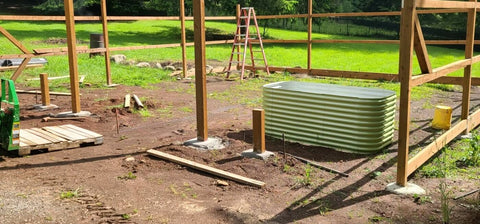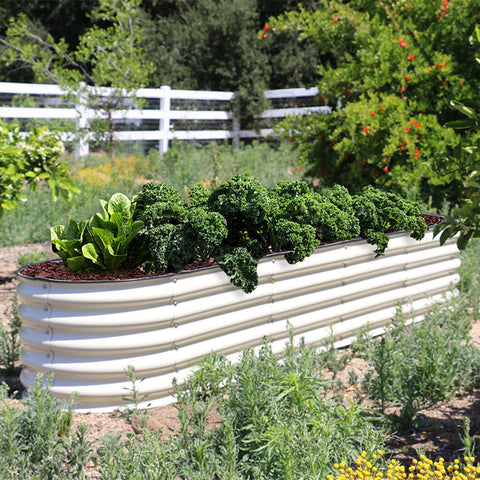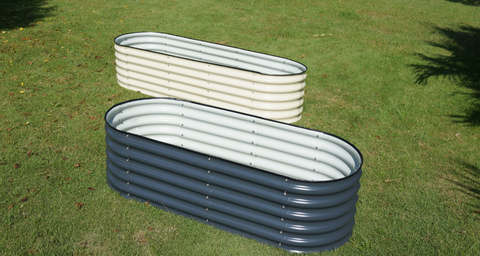Tips from Olle Garden Bed: Gardening Skills Improving
I met many people who told me that they wanted to have a garden, but they had "black thumbs". Then they continued to tell me stories about all the plants they managed to kill during their short gardening career. You just don't know how to garden! The following content also has some reference value for raised garden beds.
Well, if you happen to be like these people and think you have a black thumb, let me tell you the real truth. are you ready?
The Truth of Gardening
I know the truth can be painful. But in this case, it can also set you free. When you no longer believe that you have a black thumb, but realize that the truth of gardening is that you only need to overcome a learning curve, your entire view will change.
I don't know why, but there is an absurd belief that gardening is something you should naturally know how to do. This is not true at all. In fact, it is almost crazy to think that there is even a trace of truth in this idea.

As any real gardener will tell you, gardening is both a learning skill and an art form. Like all other abilities and art forms that are worth improving, it takes time and energy to become a good gardener. Fortunately, like all other meaningful skills you can learn, the fastest way to improve your skills is to learn with someone who has already reached the expert level.
If you want to quickly track your gardening education, please consider these methods to learn from skilled gardeners and quickly become one of your own.
- Become a gardener master
In the United States, land grant universities cooperate with so-called "promotion offices". These are publicly funded offices that provide agricultural knowledge of land grant universities to the wider public.
They do this by offering a large number of free or low-cost courses to interested parties. In addition, they run the Master Gardener Volunteer Program. This program allows you to visit a wide range of garden training resources in exchange for the volunteer work of the main gardener to help the promotion office share university research results with the gardener.
In order to become a volunteer gardener master, I had to take 40 hours of courses and do 40 hours of volunteer work under the supervision of senior gardener masters. This is the best garden training I have ever received.
In addition, it enables me to gain a lot of experience by helping other people's gardens. Now, I can find problems early and solve them on my homestead before they take over.

You must apply. You must also commit to volunteering in your community. However, a good homestead is to establish local community relations. Therefore, for me, becoming a gardener master is a complete win-win!
Even if you don't have time to volunteer as a gardener master, the expansion program has some of the most useful free gardening information.
- Attend free online courses
One thing I learned from gardeners is that they also tend to help others garden. I suspect this is related to the fact that research after research shows that gardening people are happier and healthier. When you feel good, you also want to help others feel good.
This phenomenon leads to a large amount of free gardening information online. There are even plenty of free courses that you can take at your comfortable home. Here are some of my favorite places to use free gardening education in your home.

Ecology is in action - this is based on the bio intensive gardening method supported by John Jeavons, a horticulturist and one of my personal heroes. It includes video and written text to help you plant a great garden with minimal effort.
No Digging - Check out Charles Doughty's YouTube channel for plenty of free information about digging free gardening. These videos are so beautiful. They are like "garden porn", which makes you excited and run out to start your own garden!
Sustainable Agriculture Course - Sustainable agriculture is a good gardening method for farmers who are trying to grow food in a closed loop system (for example, only a one-time cost input). Although you usually need to pay for advanced courses, many introductory courses are free. I like Andrew Millison's Introduction to Sustainable Agriculture, Bill Morrison's Lecture Series on Sustainable Agriculture and Will Hook's Introduction to Sustainable Agriculture very much.
Organic Planting - This organic retailer has an extensive library of easy to understand gardening videos. It is not organized like a class. But almost all videos are entry-level, so you can choose the video you are interested in.
- Attend exhibitions, summits or seminars
If you want to get a lot of gardening information in a hurry, try attending a gardening seminar or summit. Botanical gardens, academic institutions, horticultural clubs and organizations often hold these activities in spring or autumn.
In addition, many activities are even held online these days. For example, the Earth Mother News began to display many educational activities online at their regional expos. As early as 2014, I "participated" in my first online gardening summit, which was called the local food summit hosted by GrowNetwork. This is the first time I learned the importance of planting a homestead garden that focuses on high calorie staple food crops.

- Read the gardening blog
When I first started gardening, I spent a lot of time reading other people's gardens on different blogs. Understanding their challenges, answers, and mistakes helped me avoid the same problems.
In addition, reading gardening posts from very experienced gardeners with a long history of success helped me learn best practices, so I didn't have to make all these classic novice mistakes.
- Read gardening books
Especially in the field of horticulture, there is an incredible amount of information, gardening guides.
conclusion
From now on, when you hear someone say they have a black thumb, do them a favor. Tell them the truth about gardening - there's no such thing as a black thumb!
All you need to overcome the black thumb myth is some guidance from experienced gardeners to help you get started. In addition, you need the courage to start and the endurance to persevere.
Gardening is one of the most valuable skills on the homestead, as well as for a healthy and happy life. First, be a person, then share your talents with others, so that they can be happy!
